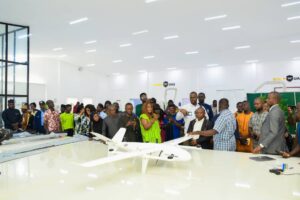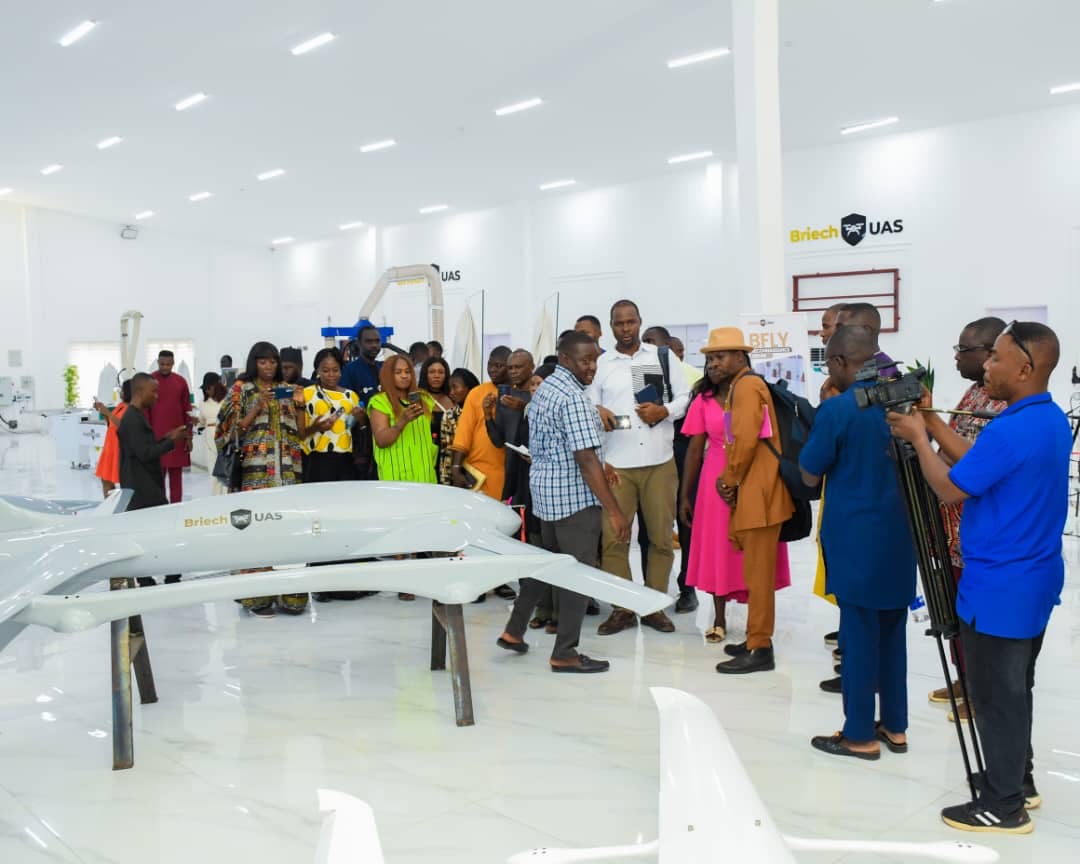By Patricia Amogu, News Agency of Nigeria (NAN)
In the face of Nigeria’s deepening security crisis, marked by terrorism, banditry, kidnapping, and communal violence, a glimmer of hope is on the horizon as homegrown security innovations gain momentum.
These indigenous initiatives are gradually taking centre stage, lifting the spirits of millions and giving balance to the lives of many vulnerable and displaced communities across the country.
Recently, a groundbreaking collaboration between the Nigerian Military and Briech Unmanned Aerial Systems (UAS) birthed the first and largest indigenous attack drones and bomb systems in Nigeria and Africa.
Unveiled at the company’s Abuja headquarters, this cutting-edge technology is being hailed by stakeholders as a potential game changer in the fight against insurgency and organised crime.
According to Mr Bright Echefu, Chairman of EIB Group and founder of Briech UAS, the innovation became imperative as extremist groups like Boko Haram and ISWAP increasingly weaponised commercial drones to spy on troops, coordinate ambushes, and conduct aerial attacks.
“Our enemies are adapting fast; they are using off-the-shelf drones to launch crude but deadly strikes.
“We cannot afford to rely on outdated tools anymore,” he said.
Echefu said that as Nigeria continued to invest in indigenous defense manufacturing, the country might potentially become a player in defence and security issues of many countries.
Of interest, the European Union Agency for Asylum (EUAA) characterises the Nigeria’s security situation as complex and deteriorating, citing armed banditry and widespread kidnappings as the leading causes of instability.
Available data indicates that in 2023 alone, more than 75 per cent of conflict-related deaths were reported in the northern region.
Attacks by Islamist groups, counter-insurgency operations, separatist tensions, and herder-farmer clashes continue to fuel widespread displacement and humanitarian distress.
The North-East, in particular, has seen entire communities fleeing for safety as armed groups impose levies and destroy essential infrastructure.
According to EUAA figures, more than 21,000 Nigerians applied for asylum in the EU+ between January 2023 and March 2024, signaling a troubling trend of migration driven by insecurity.
 A security expert said Briech UAS’s new technology promised to enhance Nigeria’s ability to detect, deter, and respond to security threats in real-time.
A security expert said Briech UAS’s new technology promised to enhance Nigeria’s ability to detect, deter, and respond to security threats in real-time.
“For the fast rising tech company, some features stand out an advanced surveillance and thermal imaging for wide-area monitoring, real-time intelligence gathering to support on-ground tactical operations, rapid response capabilities to intercept or neutralise threats before escalation and cost-effective, scalable solutions for ongoing border and community surveillance
“These drones also have potential applications beyond combat, such as disaster response, infrastructure inspection, and search-and-rescue efforts.
“As traditional security methods struggle to match the speed and complexity of modern threats, indigenous technological solutions like Briech’s are increasingly vital.
“The partnership with the Nigerian Army reflects a broader strategic shift—one that embraces innovation, local expertise, and adaptive warfare tactics to restore safety and rebuild public confidence.
“As Briech UAS positions Nigeria at the forefront of drone-powered security innovation in Africa, citizens and stakeholders alike are watching with cautious optimism there is a dim of light at the end of the tunnel,’’ he said.
The Chief of Defence Staff (CDS), Gen. Christopher Musa, described the initiative as a significant step in Nigeria’s journey toward self-reliance in defence technology and national security enhancement.
He said that the innovation was a game-changer in an era of complex and asymmetric security threats, emphasising the significance of producing local military solutions, especially in the face of global politics and procurement challenges.
“These force multipliers will play a vital role in enhancing the operational effectiveness of our military, particularly in a world where global politics surrounding the procurement of advanced military hardware have become more intricate.’’
The CDS said that countries that did not produce such solutions faced bureaucratic bottlenecks and diplomatic hurdles when acquiring the critical platforms.
“We are facing such challenges directly, if you do not produce what you need, you will be at the mercy of others, even when you have the financial resources to acquire them,” he said.
He said that the drones would help Nigeria respond swiftly to security challenges, cutting down on dependence on foreign equipment.
In his submission at the unveiling, Gov. Caleb Mutfwang of Plateau said that homegrown solutions had great impact for the country’s security needs.
He emphasised on the importance of protecting national sovereignty and safeguarding the country from activities of non-state actors.
“We have made a mistake by allowing non-state actors to acquire capabilities that rival those of state actors,” Mutfwang said.
He said that Plateau was actively working with local manufacturers like Briech UAS, with drones already deployed in the state, improving the effectiveness of security operations.
 Deserving no less attention, Echefu, during a media tour of the firm’s security facilities, said that through innovation and advanced technology, Nigeria could handle its security challenges.
Deserving no less attention, Echefu, during a media tour of the firm’s security facilities, said that through innovation and advanced technology, Nigeria could handle its security challenges.
According to him, the company provides intelligence support for Nigeria’s security agencies though digital forensics, tracking and critical assets as well as supply of combat and surveillance drones.
He said it manufactured Arginin Reconnaissance Drones configured for high-performance reconnaissance and surveillance missions.
“The company also produces Arsenio BFLY and Xander Reconnaissance drones among other super precise attack drones that can navigate difficult environments.
“These systems are crucial in combating insurgent groups, adopting different drones for reconnaissance and attack missions.
“The primary purpose was to demonstrate the capabilities of the security apparatus deployed to fight insurgency, its potential is to enhance counter-insurgency operations and mitigate the threats posed by insurgent groups.
“The significance of this effort lies in stressing the potential of the equipment to enhance intelligence, surveillance, and reconnaissance (ISR) capabilities.’’
He said the tools would also improve force protection and reduce troop casualties by minimising reliance on manned reconnaissance missions.
According to him, the use of commercial drones by insurgent groups presents significant challenges for security forces.
“To address this, the security apparatus is leveraging technologies like drone detection and jamming systems, improved intelligence gathering, and counter-drone systems.
“The system will generate insights from the collected data, allowing for better decision-making and improved resource allocation.
“This system will provide at-a-glance dashboards showing the status and location of monitored items, including parameters like satellite imagery and intelligence gathering capabilities to support security agencies,’’ he said.
Echefu said with the right support and increased investment, indigenous companies had the capacity to provide the needed logistics support to the military in the fight against insecurity.
He acknowledged the support from government to the indigenous security firms and called for more policies to foster Nigerian companies’ growth, especially those in defence and security sector.
“I can tell you that I am not the only one that is into supporting the various sectors, by local activities, local productions; there is a lot going on. People are producing even tractors in Nigeria now.
“Nigeria has 100 per cent capacity right now to end this urgency with the number of local companies that are investing heavily.
“The Nigerian military strongly supports local manufacturers through research collaboration and support,” Echefu said.
Security analysts are of the view that more states should embrace drones for comprehensive surveillance, especially for hard-to-reach areas.
They say collaboration between the Nigerian Military and Briech will boost cross-border counter-terrorism operations and strengthen internal control over weapons systems and logistics. (NANFeatures)












